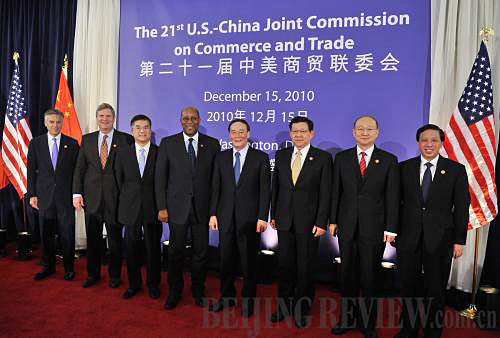|
 |
|
TALKING BUSINESS: Chinese Vice Premier Wang Qishan (fourth right) attends the 21st U.S.-China Joint Commission on Commerce and Trade in Washington, D.C. on December 15, along with U.S. Trade Representative Ron Kirk (fourth left) and U.S. Secretary of Commerce Gary Locke (third left) (ZHANG JUN) |
When Chinese Vice Premier Wang Qishan and a delegation of around 100 officials traveled to Washington on December 14 for trade talks, the situation was not in their favor.
The day before the bilateral meeting, the WTO rejected China's complaint against punitive U.S. tariffs on Chinese tires since September last year. This ruling was welcomed by U.S. Trade Representative Ron Kirk. China's Ministry of Commerce Spokesman Yao Jian, however, said China would appeal the ruling.
The WTO ruling wasn't expected to have a substantial impact on the trade talks—the U.S.-China Joint Commission on Commerce and Trade (JCCT), said Steven Dunaway, Adjunct Senior Fellow for International Economics with the Council on Foreign Relations, during an interview with Beijing Review prior to the talks.
"I don't think there is an expectation that there will be any major solution to areas where there is disagreement," he said.
The JCCT was established in 1983 as a platform for the two countries to address trade issues and promote commercial opportunities. The mechanism now includes a number of working groups in the areas of trade, investment, intellectual property rights, product safety and agriculture.
This year's meeting was the 21st gathering and was co-chaired by Kirk, Wang and U.S. Secretary of Commerce Gary Locke. The meeting reportedly set the stage for Chinese President Hu Jintao's state visit to Washington early next year.
Since the last JCCT session, held in China in October 2009, China and the United States have worked hard on resolving matters of concern with a "constructive, cooperative attitude," Wang said at the opening of the meeting.
Last year, China was the largest supplier of U.S. imports and the third largest market for U.S. exports, according to the U.S. Department of Commerce. Locke released a statement on the agency's website that indicated the U.S. trade deficit had declined 13.2 percent since September to reach $38.7 billion in October. Exports rose more than 4 percent from September to October, with the most going to Mexico and China.
"A sharp increase in U.S. exports to China explains a little less than half of the change, and is all the more notable since there was little change in U.S. imports from China," said Christopher Cornell with Moody's Analytics, as quoted by BBC News.
Despite that, the U.S. trade deficit with China is still a sensitive issue and regarded by analysts as being politicized at a time when the United States is striving to bring down its unemployment rate.
There are a number of trade-related issues on which the United States is eager to push China to make changes, including revaluing the Chinese currency at a faster pace, ending the "indigenous innovation" policy, enforcing the protection of intellectual property rights and removing barriers on U.S. beef exports.
The United States raised these issues in a bid to further trim its trade deficit with China, said Bai Ming, a researcher with the Chinese Academy of International Trade and Economic Cooperation. Driven by a desire to protect domestic economy and increase exports, Washington is unlikely to compromise, he told the Beijing-based International Finance News.
Derek Scissors, a research fellow at the Heritage Foundation's Asian Studies Center, said that the JCCT will not be effective in solving all these problems, as "the United States has introduced far too many topics than reasonable, while China seems to see the talks as an end in themselves."
"The initial problem is that the United States is not consistent in its positions," Scissor told Beijing Review. "What it wants from China is made unclear by the raising of too many issues."
Scissor has been critical of Chinese economic policy, but now says "the United States must decide what single area it considers most important and make a specific request of China in that area, only."
While the United States is pushing China to do more to open its doors to U.S. exports, China asked the United States to relax export controls on hi-tech products. China also wants the United States to recognize it as a market economy and obtain equal treatment for Chinese companies investing in the United States, Wang said during the bilateral talks.
At this year's JCCT, seven bilateral agreements were signed, including those on agriculture, energy and investment.
But the discussion itself, even if it is only meant to send a signal, can be useful, said Dunaway. "The talks themselves are useful outlets for the two countries to reach some kind of understanding or agreement before ending up in more formal trade actions, either in the form of a WTO complaint or domestic anti-dumping and countervailing," Dunaway said.
It is only natural that disputes frequently break out between China and the United States given their close trade ties, said Song Songxing, a professor with the Nankai University in Tianjin.
In this context, bilateral trade consultations should focus on defining the two countries' respective positions in the global industrial chain, so that they can engage in healthy competition instead of vicious confrontation.
(Reporting from New York) | 